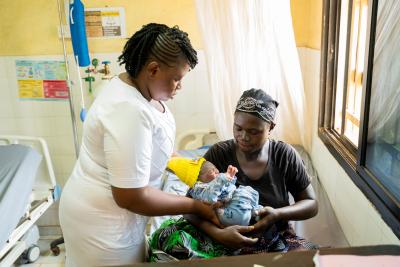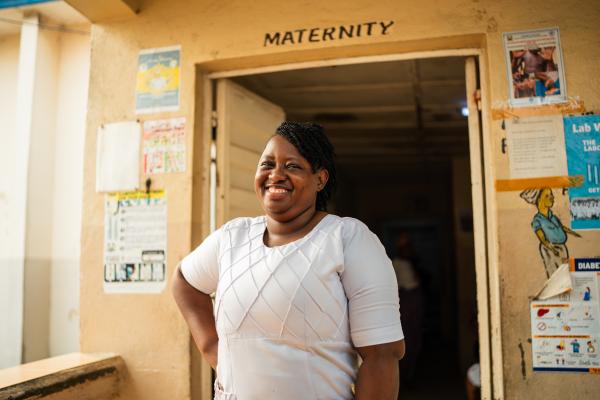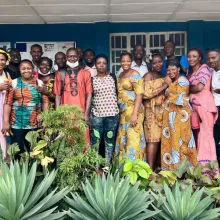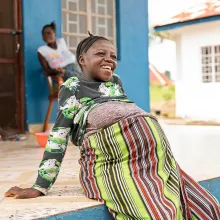*Trigger warning: Mentions of sexual abuse and physical violence. If you are struggling with depression, anxiety, or life’s challenges, reach out to Sierra Leone’s free mental health helpline today: Call 5116
The first time the public caught a glimpse of Grace’s story was through a feature on PIH Sierra Leone’s Monday Motivation series. In a brief segment, she shared her struggles with depression and post-traumatic stress disorder (PTSD) as well as her difficult journey toward healing. This interaction initiated a deeper conversation, where Grace opened up about her life with remarkable honesty. Despite being let down by multiple systems throughout her life, she chose to seek mental health care through PIH. Today, she has transformed into a mental health champion at Koidu Government Hospital (KGH). She inspires others and advocates tirelessly to reduce the stigma surrounding mental health.
“… a few breakdowns”
Grace’s first recognition of her mental health struggles came unexpectedly during a mental health class at nursing school. “As the professor described the signs and symptoms of certain mental health conditions, I realized that they applied to me,” she recalls. Without easy access to care back then, she went on as usual. Later, while working at KGH, a transfer to the maternity ward triggered severe symptoms, driving her to seek professional help. “I had a few breakdowns and confirmed that I needed help,” she says.
“… a man of God”
Looking back, Grace knows her mental health challenges stemmed from a series of traumatic events. As a teenager she was groomed and sexually assaulted by a trusted religious leader in her town. “At that time, I was young and naïve. I thought a man of God wouldn’t hurt me,” she explains.
Afraid that no one would believe her, Grace stayed silent. In the weeks that followed, she became physically unwell. While seeking care at a clinic, a pregnancy test was done, and it came out positive. The moment she entered the maternity ward, the taunting that would set the tone of her pregnancy and birth began.
Overwhelmed by stress and with vague memories of that traumatic night, she insisted that she hadn’t had sex yet. “With no regard for confidentiality, staff began calling me ‘Virgin Mary’- the girl who didn’t have sex and got pregnant.” Following the assault, the bullying by health care workers deepened her isolation.
“…I became numb”
Grace’s fear of being in a maternity ward intensified when it was time to give birth. “I was scared to get a pelvic exam, and they held me down and did it forcefully,” she recounts. “I don’t remember how the baby came out.” The trauma of the birth made it impossible for her to bond with her child. “I felt anger toward her and blamed her for everything I had gone through,” she says.
With encouragement from her mother, Grace returned to nursing school. After completing several internships and short-term jobs, a former lecturer sent her a link to an open position in the special care baby unit (SCBU) at PIH. Although she had no interest in maternity care or working with children, she applied hoping to start at the SCBU and later transfer to another department. “I got used to the work and started liking babies. I saw how distressed mothers became when their kids weren’t doing well and how some couldn’t sleep. It made me realize the kind of bond mothers are supposed to have with their kids,” she describes.

Grace Yei Moore-Sourie, nurse in the maternity ward at Koidu Government Hospital, compassionately cares for a mother and her newborn.
Sean Andrew Bangura / PIH
“… I messaged on WhatsApp”
Seeking professional help, Grace reached out to Chenjezo Gonani, PIH’s mental health program lead. “I messaged Gonani on WhatsApp and he responded right away. He put aside his work and listened to me,” she says. This wasn’t the type of service she anticipated. When she expressed concerns over confidentiality, he assured her that his team has built a system that people can trust.

PIH’s mental health program lead Ghenjezo Gonani (right) played a key role in connecting Grace Yei Moore-Sourie to vital mental health care.
Sean Andrew Bangura / PIH
Despite acknowledging general gaps in mental health support for health care workers, Gonani points out that stigma remains a major barrier preventing staff from accessing care even with the mental health team’s ongoing efforts to raise awareness and share available resources. Currently, PIH-SL operates an anonymous helpline that’s available 24 hours a day, 7 days a week.
PIH-SL counselors based in both Kono and Freetown are always available to provide support. Gonani has observed that many health care workers feel more comfortable confiding in their colleagues. As a result, the mental health team often reaches out after concerns are raised by peers. To improve access and early support, the team is developing new strategies to increase face-to-face interactions between counselors and staff. “We are growing as an organization and it can be difficult to catch people early, so we are trying not to delay interventions,” he comments.
With help from the social support team, Grace began traveling to Freetown to receive care at the Sierra Leone Psychiatric Teaching Hospital (SLPTH) twice a month. “For the first time, I was able to express everything I was feeling,” she explains.
“… I feel like God has a plan for me”
Working for PIH has opened two important doors for Grace: access to mental health care and support to further her studies in midwifery. “I feel blessed, and I feel like God has a plan for me,” she says. “I am going to embrace it and see where it takes me.”
In her downtime, Grace enjoys watching movies, reading, being on social media, and writing. “I’ve been writing a story about my life, and I was thinking of completing it after my studies,” she shares. It has been a year without symptoms, and Grace remains committed to pursuing the things that bring her joy, despite the lingering stigma. “I’m no longer triggered by people’s comments. I do what makes me happy, even if others call me crazy or mad.” Part of her healing also includes rebuilding her relationship with her eight-year-old daughter and finding the strength to forgive those who harmed her during her pregnancy.

Grace Yei Moore-Sourie, a dedicated nurse in the maternity ward, finds joy and fulfillment in caring for mothers and newborns every day.
Caitlin Kleiboer / PIH
Grace believes that maternal mental health care extends beyond the mother alone. She emphasizes that it must be taken seriously due to its wide-ranging impact on children. “Among other things, we need to relearn how we talk to women and how we get consent. People should ask themselves, if I were this woman, would I want to be treated like this?” she says.
From a deep fear of maternity wards to assisting with deliveries and earning a scholarship to study midwifery, Grace has transformed her experience into a commitment to supporting other women in her community.



